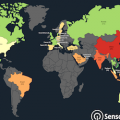PTE考生目前最大的问题之一就是练习题缺乏。除了有限的基本官方书(PLUS,Testbuilder, OG)之外就没有题了。很多英语基础不是很扎实的同学很难找到练习材料。悉尼文波雅思PTE培训学校专门为澳洲,尤其是悉尼、墨尔本的PTE考生准备了适合PTE听力阅读练习的科学60秒。各位PTE同学可以练习PTE听力中的summarise spoken text和PTE口语中的retell lecture,PTE听力口语-科学60秒-Frosty Moss练习记笔记技巧和复述。废话少说,下面开始:
听力内容:
60秒科学节目(SSS)是科学美国人网站的一套广播栏目,英文名称:Scientific American – 60 Second Science,节目内容以科学报道为主,节目仅一分钟的时间,主要对当今的科学技术新发展作以简明、通俗的介绍,对于科学的发展如何影响人们的生活环境、健康状况及科学技术,提供了大量简明易懂的阐释。
This is Scientific American — 60-Second Science. I’m Christopher Intagliata.
Climate change may be partly to blame for the massive die-off of pine trees in the western U.S. But it works the other way, too: forest die-offs can alter the global climate.
“I like thinking of this as a parallel to something like El Nino.” Abigail Swann, an ecological climatologist at the University of Washington. “We think these are also going to have climate impacts far away from where those forests are dying. So it’s going to ricochet in other places around the globe.”
To model those “ricochet” effects, Swann and her colleagues used climate simulations to wipe out forests and replace them with grasslands, in the western U.S., the Amazon, or both. They found that losing forests in one part of the globe does indeed affect climate very far away. “And that could be negative in a lot of places, it could be bad for the ecosystems in another places, but you could come up with scenarios where it makes the conditions a little bit better.”
For example, killing off trees in western North America leads to cooler temps globally. That outcome means lower productivity in Siberian forests—a negative. It also dries up forests in the Carolinas—another negative. But conditions will get wetter in eastern South America—a positive for the forests there. The results are in the journal PLoS ONE.
One surprise, though, was that when researchers erased forests in both the Amazon and the western U.S.—it had an unpredictable, synergistic effect on global climate. “If we were to think about forest management around the globe, it really suggests we should manage in a coordinated manner rather than independent entities. Because the climate response to these changes in forest cover is going to be a function of all of them happening at the same time.”
We do do that to some extent—like managing tropical deforestation through the U.N. But this study suggests we need to keep it up, and do even better, if we want to see the global forest for the trees.
Thanks for listening for Scientific American — 60-Second Science Science. I’m Christopher Intagliata.
墨尔本悉尼文波PTE原创首发
更多精彩请持续关注微信wenbo_tv2。





